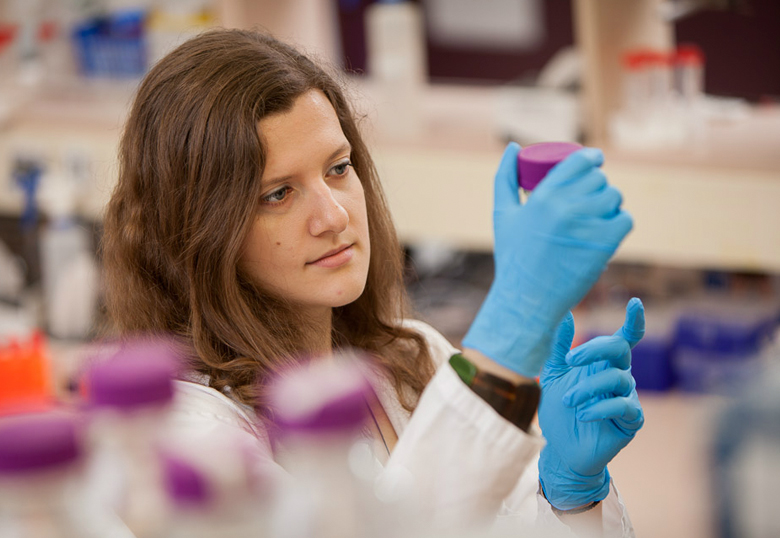Anna Kovalchuk (BSc ’14, MSc ’15), a PhD student at the University of Lethbridge, is one of 166 doctoral students in Canada to be awarded a 2015-2016 Vanier Canada Graduate Scholarship.
The recent announcement by the Government of Canada also included 70 new Banting Postdoctoral Fellowships, for a total financial commitment of $34.7 million to attract and retain the best young doctoral students and post-doctoral fellows in Canada and around the world.

“I congratulate all recipients of this year’s Vanier Canada Graduate Scholarships and Banting Postdoctoral Fellowships, says Kirsty Duncan, minister of science. “This investment represents our government’s commitment to support emerging researchers whose hard work will help put our country at the forefront of scientific discovery while equipping them with the skills they need to join a strong middle class.”
“It’s a very prestigious scholarships offered in Canada and it was a little bit unexpected. It’s such a competitive scholarship but my hopes were high,” says Kovalchuk. “These scholarships are incredibly important; it’s an incentive to continue with research, at least it is for me.”
The scholarship is worth $50,000 per year for three years, which Kovalchuk says will be put to good use in helping her continue her research. At present, she’s working on completing her doctoral degree under the supervision of Drs. Bryan Kolb and Robbin Gibb.
With Kolb and Gibb, Kovalchuk is researching the effects of chemotherapy on the brain using a mouse model. Many patients, after receiving chemotherapy, report having effects with their attention, memory and cognitive function. The effects are known as chemo brain.
“We’re exploring what is happening at the molecular level that is causing this side effect. If we can figure out what is going on, it will be a foundation for helping ameliorate or even eradicate these side effects,” says Kovalchuk.
Kovalchuk started the research while doing her master’s and has added another element since she started her doctoral work. Partnering with Champions Oncology in the United States, a firm that offers personalized cancer treatment, she is looking at the brains of mice implanted with samples of patients’ tumours and treated with chemotherapy.
“We were lucky enough to get the brains of these animals. Now we can see at the molecular level what the presence of a cancerous tumour does to the brain and what happens after chemotherapy treatment,” she says. “From our results, we might have to rename the term ‘chemo brain’ to include ‘tumour brain’ because the presence of a tumour has a huge effect on the brain and chemotherapy adds more.”
Kovalchuk eventually hopes to become a radiation oncologist. She has been accepted into the University of Calgary Cumming School of Medicine and will start her studies there next July. She’s passionate in her desire to combat cancer and has consistently been among the country’s leading fundraisers for the CIBC Run for the Cure Post-Secondary Challenge.
“I’m really grateful to everyone who got me to this point, from my supervisors and other mentors from the U of L and the U of C and the Jack Ady Cancer Centre to my parents for guiding me in this direction,” says Kovalchuk. “I’m glad it’s all come together and I’ll take the opportunities as they come.”


